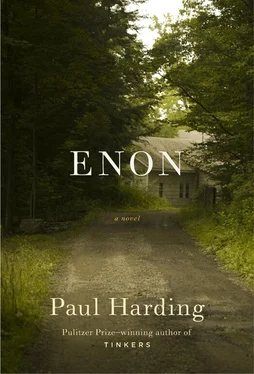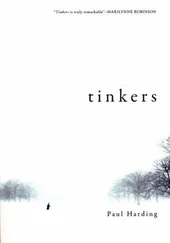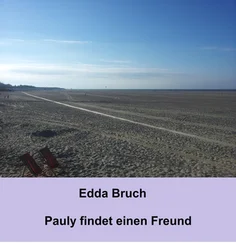Paul Harding - Enon
Здесь есть возможность читать онлайн «Paul Harding - Enon» весь текст электронной книги совершенно бесплатно (целиком полную версию без сокращений). В некоторых случаях можно слушать аудио, скачать через торрент в формате fb2 и присутствует краткое содержание. Жанр: Современная проза, на английском языке. Описание произведения, (предисловие) а так же отзывы посетителей доступны на портале библиотеки ЛибКат.
- Название:Enon
- Автор:
- Жанр:
- Год:неизвестен
- ISBN:нет данных
- Рейтинг книги:3 / 5. Голосов: 1
-
Избранное:Добавить в избранное
- Отзывы:
-
Ваша оценка:
- 60
- 1
- 2
- 3
- 4
- 5
Enon: краткое содержание, описание и аннотация
Предлагаем к чтению аннотацию, описание, краткое содержание или предисловие (зависит от того, что написал сам автор книги «Enon»). Если вы не нашли необходимую информацию о книге — напишите в комментариях, мы постараемся отыскать её.
Powerful, brilliantly written, and deeply moving Paul Harding has, in Enon, written a worthy successor to Tinkers, a debut which John Freeman on NPR called "a masterpiece." Drawn always to the rich landscape of his character's inner lives, here, through the first person narrative of Charlie Crosby (grandson to George Crosby of Tinkers), Harding creates a devastating portrait of a father trying desperately to come to terms with family loss.
Enon — читать онлайн бесплатно полную книгу (весь текст) целиком
Ниже представлен текст книги, разбитый по страницам. Система сохранения места последней прочитанной страницы, позволяет с удобством читать онлайн бесплатно книгу «Enon», без необходимости каждый раз заново искать на чём Вы остановились. Поставьте закладку, и сможете в любой момент перейти на страницу, на которой закончили чтение.
Интервал:
Закладка:
I decided to break into Mrs. Hale’s house and find the orrery. Nothing in the world seemed more important suddenly than turning the crank and feeling the perfectly machined resistance it offered and the perfect ratio of force applied and degrees that the crank turned to the various periods of the celestial bodies, from the almost imperceptible orbits of the outer planets to the smallest little moons, which spun as quickly and neatly as tops. I walked in a straight line across the road and across her meadow, right toward the few lights on in her gigantic house. I made no attempt to conceal myself or to be quiet. I did not think about looking for any drugs. She’s an old Yankee nanny goat anyway, I thought. I bet she’s never even swallowed an aspirin.
“Your old pop may be headed for a stretch in the joint, kid,” I said. “But it’s time, way past time. There’re some things in this place you just have to see.” I thought about the James Cagney and Edward G. Robinson gangster movies we’d watched together, which, unlike the old westerns we’d seen, she had genuinely loved. I drew a deep breath and shook my head and smiled in disgust at myself and said, “Made it, Kate — top of the world. Anyway, what I’m about to show you is something else .”
I walked up to Mrs. Hale’s broad, oak front door, the one my grandfather and I had stood before, what, I thought, twenty years ago, waiting for Mrs. Hale to let us in. I grabbed the brass door handle and pushed down on the leaf-shaped lever with my thumb and it went down all the way and I pushed on the door and it swung open inward and I walked into her front hall. The hall was lit by a single, dim, candle-shaped bulb set in a wall sconce. It was wide and deep and receded into the darkened depths of the house. Dark paintings in gold frames lined the hall. All were portraits of men and women I took to be Mrs. Hale’s ancestors. The floorboards creaked and echoed as I walked down the hall. It turned left at the back of the house and continued lengthwise. I came to a large stairway that rose eight steps to a landing on which stood the Simon Willard tall clock I’d fixed with my grandfather. I peered up at its austere dial.
“Come along. I’m right in here,” a voice barked. I startled and turned to run but remained on the landing. It was Mrs. Hale, and she sounded exactly the same as when she’d told Peter Lord that we sledded like girls and when she’d asked my grandfather what she owed him for fixing her clock. Her voice was clear and strong, her words as composed as if set in sharp, indelible black ink on cold, blue-white paper. I went up the rest of the stairs and crossed a wide landing to an open doorway. If running into Mr. Wallace wandering around his house at night had been like finding a puzzled half-ghost, half-man, fuzzy and vague from fumbling around between realms, Mrs. Hale seemed like the pure concentration of all the light and air and earth and people of Enon, from every lap it had ever taken around the sun, not merely from its relatively brief and no doubt fleeting career as a village of colonists but from its centuries as home to more original souls and a tract of forest, and its millennia under glaciers and at the bottoms of unnamed oceans, all taken in by her ancestral house and focused through the precisely configured windows, aligned and coordinated with the clocks and orrery and rendered into the small, prim, neatly dressed figure sitting on a plain wooden settle beneath an electric candle, in the middle of the room, the temple, the dim penetralia, everything else shrouded in darkness, as if she were an artifact in a museum or a prophet in a pew.
I stood at the door dumbfounded and already abashed to the point of reform, the forthcoming speech I imagined already a formality, already perfunctory if not for the agonizing, extra efficacy of having to hear in full the details of the charges of which I already knew I was guilty. Mrs. Hale sat with her hands folded in her lap, looking straight at me, with perfect poise — with what both of my grandparents unhesitatingly would have called character. I had the impulse to check the bottoms of my shoes to see if I had tracked dirt into the house, to smooth my hair down, to tuck my shirt in. My shame doubled, trebled. It struck me how repulsive it was for me to be inside her house, the outrageousness of it made all the starker by her sitting there with such patience and self-possession that to judge by her it was as if I were prevailing upon her tact in some small matter of manners.
I tried but could not suppress a gasp at my idiocy. “Mrs. Hale,” I said.
“Do not speak, Mr. Crosby,” she said. “I know who you are and why you are here. You will find none of what you came for in this house. I am sorry for your loss, but it is time you stopped this carrying on. It is disgraceful.”
Tears brimmed in my eyes and ran down my cheeks. I was humiliated and in awe of the woman. She possessed the majesty of plain speech.
“Mrs. Hale,” I said. It would have been foolish of me to tell her I had not come for drugs. That was somehow immaterial to her.
“I know what you are doing out there at night, Mr. Crosby,” she said. “It is not a mystery. With all your crawling, you’ll soon be going on your belly. You’ll spend your days swallowing dirt and hoping for bare heels to bite.”
“Mrs. Hale,” I said.
“Yes, Mr. Crosby.”
“I am sorry.”
“Well and fine, Mr. Crosby, but your sorrows are selfish.
You are a maker of dismal days. You burn your daughter in strange fires when I should think you would be grateful for the blessing of having had a lovely child. Enough is enough.”
I understood as she spoke that Mrs. Hale was not going to call the police. She was not going to report the break-in, or call the offices of The Daily Bread , or speak any more sternly than she already had, or, as a matter of fact, speak any more at all. I had been dismissed.
She sat still and erect on the settle, looking at a point high on the opposite wall, toward whatever it was that moored her to her convictions, clearly finished with the affair, clearly weakened and frail and, worst, frightened, another victim of my violence. The hardness of her consideration toward me was so nearly unbearable that I almost offered to help her lie on her bed or to make her tea or to care for her lawn for free for the rest of her life, gestures that themselves would have been violent, would have demonstrated that I had missed her point precisely, that I rejected precisely the straightforward responsibility she had extended to me, enacted for me.
For an instant I thought of murdering Mrs. Hale. She seemed so impossibly decent. But her dignity provoked me into humility and silence. After bowing my head and standing mute before her for a moment, I turned from the door and walked back down the hall, the wide pine floorboards creaking. I descended the dark, narrow staircase. The grandfather’s clock on the bottom landing read one-thirty. I paused in front of it for several seconds. The silence of the house was so deep that each tick of the clock seemed to enfigure in sound the brass works rotating behind the dial. The clock seemed a device for preserving and telegraphing the heartbeats of my grandfather and my grandmother and my mother and Kate, and a coffin, and a reliquary, and finally just a plain old beautiful clock. Somewhere I could not remember the orrery sat in its room, still, latent, potent in the darkness. I descended from the landing and followed the hallway back to the front door. I stepped outside into the dark night and closed the door behind me.
I WALKED ACROSS THE meadow and into the woods, into the Enon River sanctuary near where my grandfather and I and Kate and I had fed the birds from our hands so many times. I imagined the birds dropping dead from the trees until the ground was covered in a tangled mass of corpses, the beak and broken wings and soiled feathers and needle-thin bones of one animal interlaced and looped with those of the next and all the bodies knitted together. And I imagined that the plaited bodies might be lifted in a single pane and draped over my shoulders and clasped together at my throat with claws and worn like a cape or robe. It would be very light, made as it was from feathers and hollow bones. It would be very long and I would wander from the tame boundaries of the sanctuary out into a real wilderness with a great train following me that would comb up insects and grass and bark and snag on stumps, and that would constantly force me to stop and turn to gather or yank free or untangle, only to have it catch again a moment later on another barb. Bones would snap and wings unscrew from their sockets and I would leave a trail of looping feathers and scattered limbs. My thrashings would knot the garment as much as they rent it. The garment would attract living, wild birds as I passed below their nests and they would alight on it and become entangled. Over time, the garment would be transformed, expelling those first, tame birds and accumulating dark pheasants and crows and elusive little songbirds. After many years, the cape would no longer contain any of the birds from which it had been originally formed. It would become more and more gruesome as it metamorphosed from entirely dead birds to a mixture of the dead and the living. It would writhe and twist with black and brown and flutter scarlet and yellow and purple. The snared birds would peck one another bare and pick out one another’s eyes and preen themselves and eat one another and defecate upon one another and couple, all while they screeched and sang and made nests and brooded over eggs that were not theirs but had boiled up beneath them through the thickets of bones and plumage, even as their own eggs had sifted away to hatch somewhere else or fallen from the cloak onto the ground or in cold puddles, where their quickening yolks would cool and cloud to mere jelly. Sparrows would raise waxwings and crows beget finches and there would be generations of birds that were born, lived, sang, struggled, and died wholly ensnared in that monstrous cloak.
Читать дальшеИнтервал:
Закладка:
Похожие книги на «Enon»
Представляем Вашему вниманию похожие книги на «Enon» списком для выбора. Мы отобрали схожую по названию и смыслу литературу в надежде предоставить читателям больше вариантов отыскать новые, интересные, ещё непрочитанные произведения.
Обсуждение, отзывы о книге «Enon» и просто собственные мнения читателей. Оставьте ваши комментарии, напишите, что Вы думаете о произведении, его смысле или главных героях. Укажите что конкретно понравилось, а что нет, и почему Вы так считаете.












